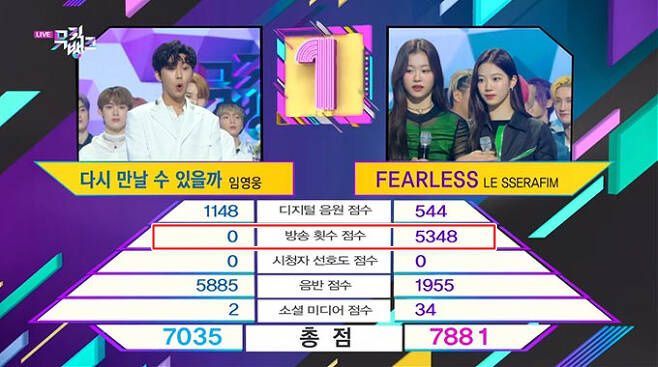Controversy grows over 'Music Bank' scoring system
이 글자크기로 변경됩니다.
(예시) 가장 빠른 뉴스가 있고 다양한 정보, 쌍방향 소통이 숨쉬는 다음뉴스를 만나보세요. 다음뉴스는 국내외 주요이슈와 실시간 속보, 문화생활 및 다양한 분야의 뉴스를 입체적으로 전달하고 있습니다.

Public broadcaster KBS has come under fire over the scoring system of its music program “Music Bank” with some viewers raising the possibility of vote rigging despite explanations by the broadcaster.
On May 13, hugely popular trot singer Lim Young-woong’s “If We Ever Meet Again” and rookie girl group Le Sserafim’s “Fearless” were in contention for first place on “Music Bank.” The trophy went to Le Sserafim as the band scored 7,881 points, beating out Lim, who earned 7,035 points.
As soon as the result was unveiled, viewers, including Lim’s fans, took to the internet to complain about the “unfairness” of the score calculation and posted their grievances on KBS’ official website demanding an explanation.
Lim was far ahead of the girl group in the digital streaming and physical album sales categories but received zero points in the broadcast category, while the newly debuted group scored 5,348 points in the broadcast category.
According to the weekly music show’s scoring system on Wednesday, the final score is based on five categories -- digital streaming scores (60 percent), broadcast scores (20 percent), viewer preference scores (10 percent), physical album sale scores (5 percent) and social media scores (5 percent). The broadcast scores are based on the frequency of appearances on KBS’ television, radio and YouTube programs.
The audience demanded KBS disclose details of Le Sserafim’s high broadcast score. In response to the controversy, the program’s chief producer said, “The points were counted from May 2 to May 8 and Lim Young-woong’s song ‘If We Ever Meet Again’ was not played on any of KBS’ television programs, radio shows and any kind digital content during the period.”
This explanation failed to appease some netizens who examined the playlists of KBS radio programs and argued that the song was, in fact, played several times during the period on the public broadcaster’s three radio stations.
KBS again attempted to clarify the matter. The broadcaster said, “There are seven selected radio programs that we count for the broadcast scores.” However, it refused to name the seven radio programs.
By Jie Ye-eun(yeeun@heraldcorp.com)
Copyright © 코리아헤럴드. 무단전재 및 재배포 금지.